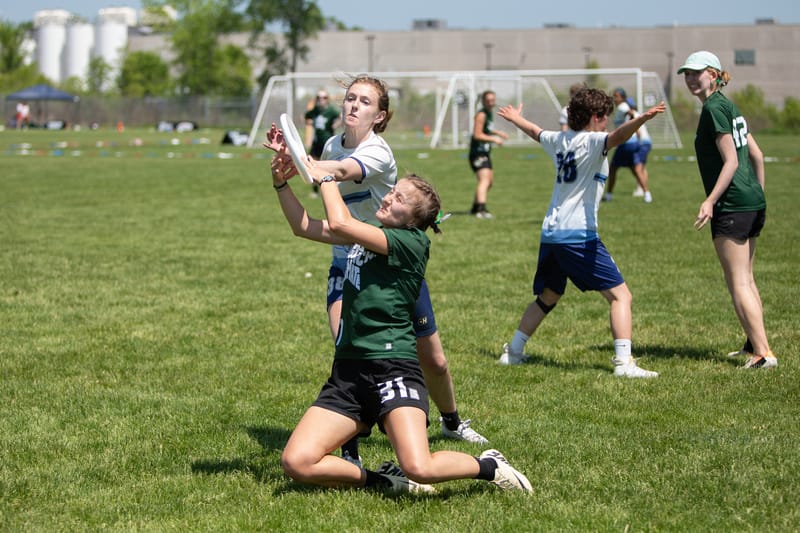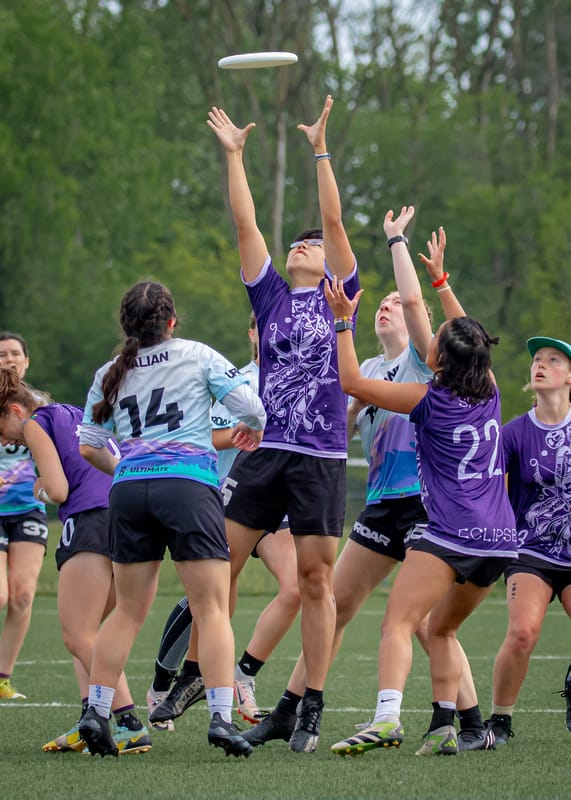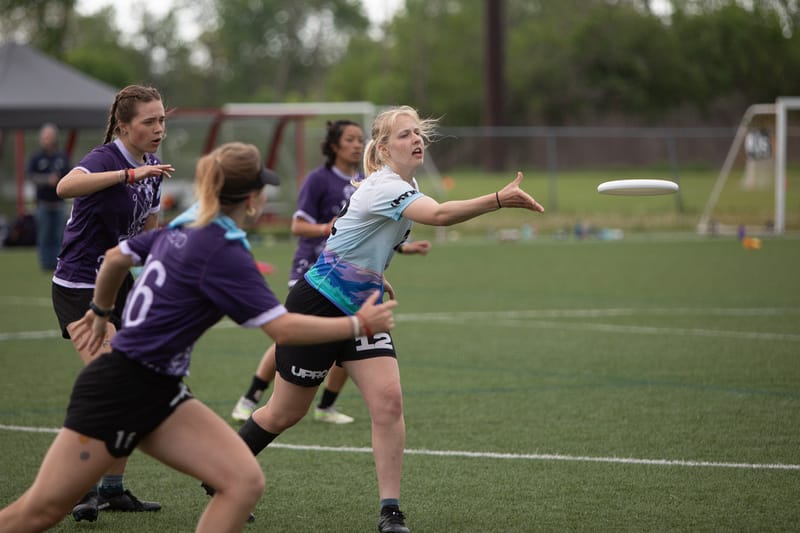These three defenders put forth amazing and impactful seasons.
June 14, 2024 by Anna Browne, Zack Davis and Theresa Diffendal in Awards with 0 comments
Each year, Ultiworld presents our annual College Awards. Our staff evaluates the individual performances of players from throughout the season, talking to folks around college ultimate, watching film, and look at statistics, voting upon the awards to decide those to be honored. The regular season and the college Series are both considered, with extra emphasis for performances in the competitive and high-stakes environment at Nationals.
Our awards continue with the Defensive Player of the Year, recognizing the individual, and two runners-up, who we felt were the top defensive performers this spring. Whether through generating blocks, shutting down options, helping out teammates, or all of the above, these defenders stood out doing the tough work that too often go unrecognized.
- Player of the Year
- All-American First Team
- All-American Second Team
- Offensive Player of the Year Award
- Defensive Player of the Year Award
- Breakout Player of the Year Award
- Rookie of the Year Award
- Coaches of the Year Award
D-III Women’s 2024 Defensive Player Of The Year
Phoebe Hulbert (Haverford/Bryn Mawr)

Hulbert acts as the lynchpin of Haverford/Bryn Mawr’s zone defense. Racking up 17 blocks, the most on a team that excels in forcing miscues, Hulbert used her height in the deep space to take away any and all deep throws. This stymied defenses, typically forcing them into the force sideline where a trap was waiting. When a thrower decided to test the vertical space, Hulbert used superior positioning and disc reading skills to come up with the block.
If “fire” was called, Hulbert excelled in person defense, using positioning and field awareness to smartly take away options for the offense. Using her knowledge as a handler, Hulbert knew when to play hard defense and when to trail behind as the cutter entered the weak space or was not an active look for the thrower. What sets Hulbert apart was their ability to get the disc moving quickly, often with teammates Zoe Costanza or Amy Tse, to generate fast break opportunities.
The Sneetches are a unique team as they run zone on all defensive opportunities regardless of whether they started on offense or not. This allows for short field turns that gives players like Hulbert an opportunity to get a block then throw a quick assist. Hulbert was integral in the Sneetches’ push against Middlebury in quarterfinals, generating four blocks and assists assists with only three turns, although the Sneetches were unable to mount a late comeback.
– Anna Browne
First Runner-Up
Rowan Dong (Carleton)

Air patrol forces took note of Rowan Dong’s efforts at the national tournament and picked up some pointers on how to defend contested airspace. Dong’s ability to keep the disc out of opponents’ hands especially in the deep space was critical in Carleton’s success. What’s more, Dong’s numbers were deflated due to the sheer threat of their ability, keeping throwers in check. Despite this Dong still posted 20 blocks on the weekend, good enough for third overall at the tournament. Dong wasn’t only lurking downfield – they also clamped down on the mark and forced some uncomfortable throws through tight spaces with high stall counts, which, while not ticking their own stats up, generated blocks for their teammates. All around Dong generated unbelievable pressure on opposing offenses, and as an added bonus, was a lightning bolt on offense.
– Zack Davis
Second Runner-Up
Hayden Ashley (Portland)

Portland’s tournament-leading point differential was only possible through a balance of defensive pressure and offensive poise found in one of its stars, Hayden Ashley. We’ve mentioned Portland’s efficiency before, but it bears mention again: throughout three pool play games and a quarterfinal, UPRoar were never broken, and in their semifinal only once. That level of dominance was thanks to Ashley’s both consistent capitalization on break opportunities and resilient defense after a turn. Her handler coverage utilized her offensive knowledge to anticipate the other team’s flow, dissuade more than a few reset looks, and force high-stall punts. Ashley recorded six blocks in the national final alone, leading the team as she prevented Carleton scores and generated break chances through run-through Ds and skying grabs.
– Theresa Diffendal